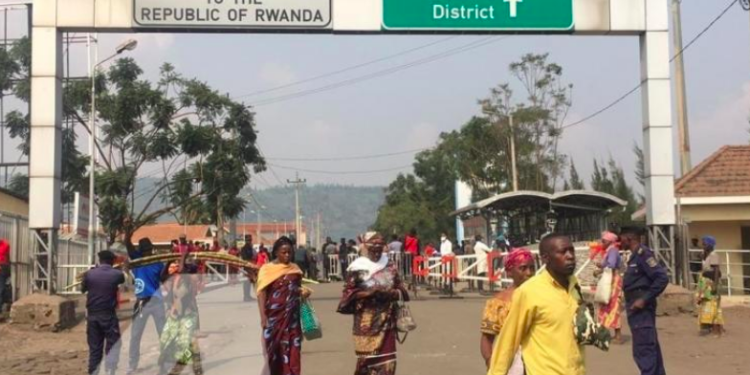The AFC/M23 admnistration in the cities of Goma (North Kivu) and Bukavu (South Kivu) have at their disposal a sizeable portion of the country’s revenue generated from customs.
La Corniche One Border Post is one of the busiest borders in the entire East African region. Bukavu border is not too busy but maintains a constant flow of trade between Rwanda and DRC.
According to Jules Alingete the state is losing 9% of customs revenue and also 3% of revenue collected by the Directorate General of Taxes (DGI).
He in capacity as DRC’s Inspector General of Finance and Head of Department at the IGF (General Tax Inspectorate) made the remarks while appearing on a “Fauteuil Blanc” program on Télé 50 on Saturday.
“In the cities occupied by the AFC/M23, in terms of customs revenue, the occupation of Goma and Bukavu has caused us to lose 9% of customs revenue,” he noted.
“We have to take into account that we are around Congolese Francs
200 million per month, sometimes up to 250 million, which customs mobilizes. You take 9%. According to the estimates given by customs, we are at 9% of the revenue we are losing due to this war in the East, and on the side of the General Directorate of Taxes (DGI), we are at 3% of the revenue we are losing,” he revealed.
Alingete expressed optimism about the mechanisms put in place by the government to avoid experiencing a shock in revenue mobilization within the framework of the current year’s budget.
“Mechanisms have been put in place so that we don’t really feel the cost, and I tell you that this year’s revenue mobilization, despite the war, will exceed all previous years because the allocations will certainly be met and the effects of the losses we have suffered in the East will be offset. We will even go beyond that,” he claimed.

Returning to the relaunch of the financial patrol, Alingete Key announced that his institution will not be sending Inspectors General of Finance to entities under the control of the AFC/M23.
“We are in war zones, are we going to send inspectors to the occupied areas? It’s perfectly normal that we can’t do that. Before the war, we had inspectors in Goma and Bukavu, and these inspectors left Goma on the last day of the invasion of the city of Goma and Bukavu, so we cannot send inspectors to the occupied areas today,” he said.
After its adoption by the National Assembly and the Senate, the draft finance bill for the 2025 fiscal year was promulgated on Sunday, December 22, 2024, by Head of State Felix Tshisekedi.
This finance bill, which came into effect on January 1, 2025, is presented as a balanced budget, in terms of revenue and expenditure, amounting to 51,553.54 billion Congolese francs.
This budget for the 2025 fiscal year represents a significant increase of 25.8% compared to the 2024 budget, reflecting the government’s determination to increase domestic resource mobilization and improve the performance of financial institutions.
Given the evolving security situation in the country, marked by the advance of the AFC/M23 rebellion, the greatest concern is whether the government will achieve its ambitions expressed in the 2025 budget.
With the fall of the cities of Goma and Bukavu, voices had already been raised in the Congolese sociopolitical environment calling on the government to prepare a supplementary budget for the 2025 fiscal year.